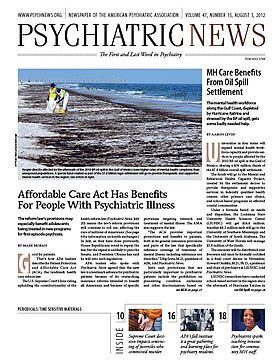Whether veterans are more likely than other individuals to take their own lives is still a matter of controversy, but recent research is at least opening doors to some useful information, said panelists at the annual Department of Defense/Veterans Affairs Suicide Prevention Conference, held in Washington, D.C., in June.
Veterans report high levels of posttraumatic stress disorder (PTSD), depression, and alcohol-use symptoms on returning from Iraq or Afghanistan, but it is unclear whether that means a greater risk for suicide, said Mark Ilgen, Ph.D., an associate professor of psychiatry at the University of Michigan and a research investigator at the VA’s National Serious Mental Illness Treatment Research and Evaluation Center of Excellence in Ann Arbor, Mich.
“Some studies find veterans at higher risk, some not,” said Ilgen. “But patients of the Veterans Health Administration [VHA] do have a seven times higher risk of dying by suicide compared with the general population.”
One study of recent veterans of the wars in Iraq and Afghanistan indicated no greater overall risk of suicide for that cohort, but Ilgen wanted to see if the presence of psychiatric conditions might increase that risk.
Of the 5.7 million VHA patients as of October 2007, about 309,000 were veterans of the recent wars. They reported significantly higher rates of psychiatric conditions—such as depression, anxiety, and PTSD—than did other veterans.
Merely serving in the war zones was not the salient risk factor, however.
Among troops with no psychiatric conditions, veterans of Iraq and Afghanistan had lower rates of suicide. That association reversed among those with psychiatric conditions, with the recent vets showing a greater likelihood of completing suicide, he said.
“The extent to which the psychiatric condition relates to risk of suicide is much stronger for the recent returnees,” said Ilgen. He noted that data on timing of onset and the effects of any treatment were not available.
“Increased screening might be helpful in this subgroup to identify those at elevated risk for suicide,” said Ilgen.
Is There an ‘Acquired Capability’?
Two interrelated questions interested panelist John Blosnich, Ph.D., M.P.H., a fellow in psychiatry at the University of Rochester and a health sciences specialist at the Veterans Integrated Service Network-2 (VISN-2) Center of Excellence for Suicide Prevention at the VA Medical Center in Canandaigua, N.Y.
One was the influence of “acquired capability,” a hypothesized vulnerability to suicide induced by physical acclimation to pain and mental acclimation to the loss of fear of death.
The other was suicide acceptability—whether a person believes in the right to end his or her life as a permissible action or a viable solution to a problem.
Blosnich used data from the 2010 General Social Survey, which included 1,430 veterans.
He reported that veterans did not have increased odds of suicide acceptability compared with the general population. However, understanding the role of acquired capability was hampered by the lack of questions in the survey related to combat exposure, deployments, and other relevant military information.
Larger samples and standardized measures will be needed in future surveys to glean information necessary to determine any link to causality, he said.
Role of Criminal Activity Evaluated
One group of veterans who would seem to be at an especially high risk for bad outcomes are those involved in the criminal-justice system.
Media attention has focused on crimes committed by returned veterans, with victims often being family members or fellow military personnel.
A study of inmates released from prisons in Washington state from 1999 to 2003 indicated that the risk of death was 3.5 times that of other state residents over the next two years (adjusted for age, sex, and race), and 12 times higher during the first two weeks following release. However, after further adjustment for demographic factors, veteran status appeared not to be a factor, said Hal Wortzel, M.D., a forensic neuropsychiatrist at the Denver VA’s VISN-19 Mental Illness Research, Education, and Clinical Centers. Interestingly, 77 percent of the veterans who were inmates in this study had honorable discharges, but 85 percent were not receiving VA benefits.
“All releasees did poorly, but veterans who were receiving benefits appeared to have some protection,” Wortzel.
More research is still needed on veterans who have served since 2001 and who are in the criminal-justice system to identify their medical and neuropsychiatric status, said Wortzel.

